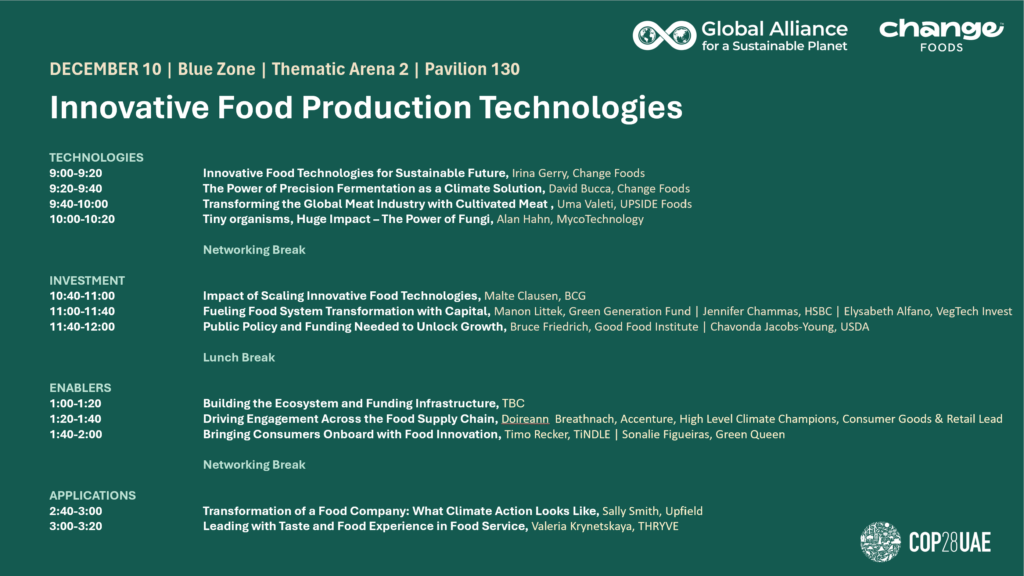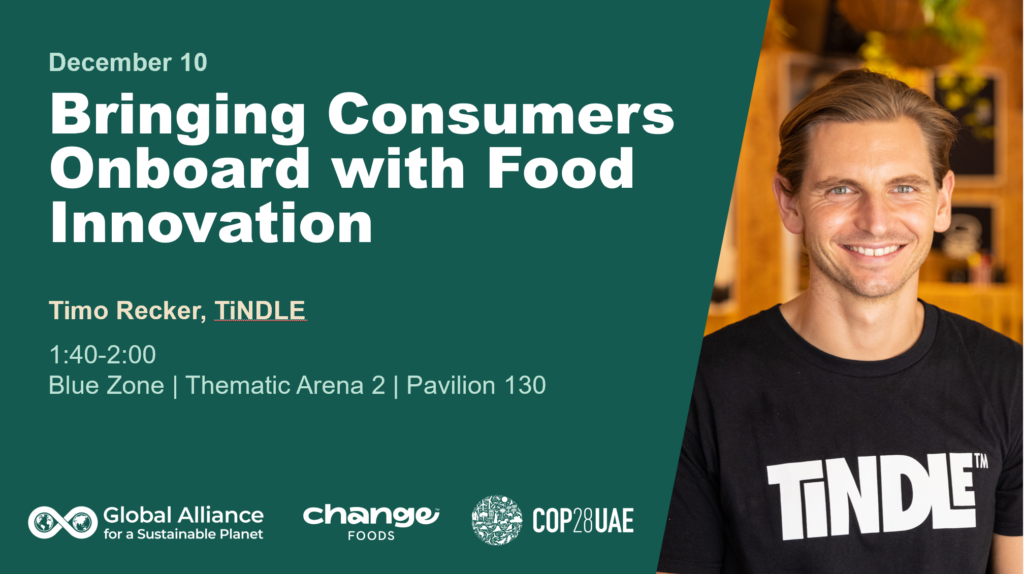Protein Diversification Startup Change Foods Co-Hosts Innovative Food Production Tech Pavilion at COP28
5 Mins Read
The Global Alliance for a Sustainable Planet is partnering with Change Foods to host a food tech pavilion at COP28 on the conference’s dedicated food day (December 10) – here’s what it will entail.
After neglecting it for years, the UN climate summit is finally focusing on the sector that contributes to a third of all global greenhouse emissions. COP28 will shine a huge spotlight on food and agriculture systems this year, with the FAO set to announce a policy roadmap to bring this industry’s climate impact in line with the 1.5°C goal set out in the 2015 Paris Agreement.
There will also be a number of food pavilions, allowing organisations and stakeholders to have open discussions about the various issues faced by our food system. It’s more important than ever, given the world is on its way to 3°C temperature rises above pre-industrial levels – a far cry from the 1.5°C we might be approaching within the next five years (even though the conference president says this target remains possible).
Food has an outsized impact on the climate. Of the 34% of human-caused emissions attributed to food, 60% comes from meat production. The livestock sector, meanwhile, is responsible for about 11-19.5% of all emissions. An increase in consumption of plant-based foods, on the other hand, can have dramatic benefits for the planet.
One study has shown that a vegan diet can help cut emissions, land use and water pollution by 75%. Another revealed that animal-derived foods cause twice as many emissions as plant-based foods. And a third one suggested that swapping just half of our meat and dairy intake with vegan alternatives can halt deforestation, reduce agriculture and land use emissions by 31%, and double overall climate benefits.
The importance of protein diversification

This is why highlighting food is essential for climate action. As part of this effort, COP28 has announced that three-quarters of all food served at the conference will be meatless. Additionally, it will host a dedicated Food, Agriculture and Water Day (December 10), which will spotlight investment in innovation, procurement around regenerative agriculture, national transformation pathways underpinned by financing mechanisms, and project preparation, as Raphaël Podselver, director of UN Affairs at non-profit ProVeg International, explains.
He adds that it’s the “first time we are having real discussions on food and agriculture at a COP summit”, and expects policy shifts aimed at promoting plant-forward diets and protein diversification, improving food security and cutting agrifood emissions.
“Protein diversification is at the core of food systems transformation,” says David Bucca, founder and CEO of Australian-American precision fermentation company Change Foods, who will be speaking on food tech and sustainability at the summit. “Innovative technologies, such as precision fermentation, offer us a way to create nutritious high-quality protein without relying on industrialized animal agricultural expansion. It is a win for the planet, a win for consumers, and a win for the animals.”
The food day will convene entrepreneurs, financiers, policymakers, ecosystem builders and commercial leaders, who will discuss methods to scale up and commercialise these technologies – a major bottleneck for the cultivated and precision-fermented protein sectors.
Food pavilions at COP28

One of the pavilions is being hosted by the Global Alliance for a Sustainable Planet (GASP), a New York-based alliance of thought leaders that incubates ideas with system-scale transformation potential by leveraging private finance for the public good. It acts as a catalyst to create partnerships between governments, international organisations, entrepreneurs, climate advocates and global investors. Co-hosting is leading US-Australian precision fermentation dairy startup Change Foods, which announced last year it would be building a production facility in the UAE.
Held in the official Blue Zone of Dubai Expo City on December 10th, the official food and agriculture day as designated by COP28 organizers, GASP’s food tech pavilion will feature several leading entrepreneurs and thoughtleaders from sustainable food companies and advocacy organizations. The day will begin with a deep-dive into different pillars of food tech, where some of the leaders in this space – like Bucca and Change Foods CMO Irina Gerry, and Upside Foods CEO Uma Valeti – will outline distinct solutions, their benefits, and the hurdles yet to pass.
The conversation will then switch to investment and the impact of increased funding and feature Elysabeth Alfano of VegTech Invest, Manon Littek of Green Generation Fund and Jennifer Chammas of HSBC, who will discuss how to achieve scale through ecosystem collaboration, before moving on to frontier companies that are making innovative products for both retail and foodservice.
Green Queen founder and editor-in-chief Sonalie Figueiras will also be speaking at the event: she will interview Timo Recker, co-founder and executive chairman of Singapore-based alt-meat brand TiNDLE Foods in a fireside chat about how to bring consumers onboard with food innovation.

“We are thrilled to partner with Global Alliance for Sustainable Planet to deliver a full day of content focused on innovative food technologies at COP28, by bringing together an incredible set of expert speakers to ensure deep learning and meaningful collaboration and to catalyse action,” said Gerry.
Likewise, the Food4Climate Pavilion will return to the UN climate summit, following a first appearance at COP27 last year. It has been established by a coalition of NGOs, including ProVeg International, World Animal Protection, Compassion in World Farming, Plant Based Foods Institute, Humane Society International, Mercy for Animals, and Four Paws, among others.
This pavilion will tackle the need for prioritising alternative protein production over animal-derived foods, as well as the overconsumption of meat in the Global North, which accounts for 92% of excess carbon emissions, which disproportionately affects vulnerable populations largely in the Global South.
Pavilions like GASP’s and Food4Climate highlight the importance of food systems transformation and hopefully can help galvanize our leaders to take meaningful climate action at COP28.




